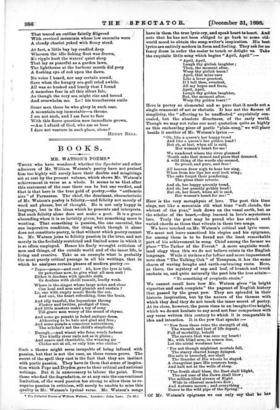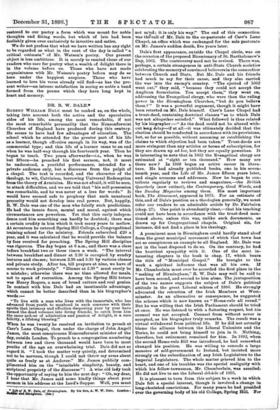BOOKS.
MR. WATSON'S POEMS.*
THOSE who have wondered whether the Spectator and other
admirers of Mr. William Watson's poetry have not praised him too highly will surely have their doubts and misgivings set at rest by the present volume, which shows Mr. Watson's achievement in verse as a whole. It seems to us that after this statement of the ease there can be but one verdict, and that is that here is the true gold of poetry,—the "authentic airs" of Parnassus. The chief, the dominant, characteristic of Mr. Watson's poetry is felieity,—and felicity not merely of word and phrase, but of thought. He is not only happy in language, but in the ideas which he presents and interprets. Bat such felicity alone does not make a poet. It is a grace abounding when it is so lavishly given, but something more is wanting. That something is passion, the one essential, the one imperative condition, the thing which though it alone does not constitute poetry, is that without which poetry cannot be. Mr. Watson joins to felicity passion in the true, and not
merely in the foolishly restricted and limited sense in which it is so often employed. Hence his finely wrought criticism of men and things, of the outside world and of the inner life, is
living and creative. Take as an example what is probably the most purely critical passage in all his writings, that in which he analyses certain phases of modern poetry :—
"Peace—peace—and rest! Ah, how the lyre is loth, Or powerless now, to give what all men seek ! Either it deadens with ignoble sloth
Or deafens with shrill tumult, loudly weak.
Where is the singer whose large notes and clear Can heal and arm and plenish and sustain ? Lo, one with empty music floods the ear, And one, the heart refreshing, tires the brain.
And idly tuneful, the loquacious throng Flutter and twitter, prodigal of time, And little masters make a toy of song Till grave men weary of the sound of rhyme.
And some go prankt in faded antique dress.
Abhorring to be hale and glad and free ; And some parade a conscious naturalness, The scholar's not the child's simplicity.
Enough ;—and wisest who from words forbear. The kindly river rails not as it glides ; And suave and charitable, the winning air Chides not at all, or only him who chides."
Such a theme might seem incapable of being infused with passion, but that is not the case, as these verses prove. The secret of the spell they cast is the fact that they are instinct
with poetic passion. They have in them that sense of inspira- tion which Pope and Dryden gave to their critical and satirical writings. But it is unnecessary to labour the point. Even those who find the degradation, or at any rate the conventional limitation, of the word passion too strong to allow them to re- cognise passion in criticism, will surely be unable to miss this quality in Mr. Watson's lyrical verse. Mr. Watson's songs
• The Collocted Poems of William Watson. London; John Lane. 173. 6d-1 have in them the true lyric cry, and speak heart to heart. And note that he has not been obliged to go back to some old.- world mood to obtain the song-writer's inspiration. His beet lyrics are entirely modern in form and feeling. They ask for no fancy dress in order the easier to touch or delight us. Take the exquisite little song which begins "April, April" :— " April, April,
Laugh thy girlish laughter; Then, the moment after, Weep thy girlish tears! April, that mine ears Like a lover greetest, If I tell thee, sweetest, All my hopes and fears, April, April, Laugh thy golden laughter, But, the moment after, Weep thy golden tears !"
Here is poetry so elemental and so pure that it needs not a single ornament of art or rhetoric. It has not the finesse of simplicity, the "affecting to be unaffected" exquisitely con-
cealed, bat the absolute directness, of the early world. Though we may not value our next quotation quite so highly as this enchanting piece of poetic "plain-song," we will place beside it another of Mr. Watson's lyrics :—
" Oh, like a queen's her happy tread And like a queen's her golden head ! But oh, at last, when all is said, Her woman's heart for me !
We wandered where the river gleamed 'Neath oaks that mused and pines that dreamed. A wild thing of the woods she seemed, So proud, and pare, and free !
AU heaven drew nigh to hear her sing, When from her lips her soul took wing; The oaks forgot their pondering, The pines their reverie.
And oh, her happy queenly tread, And oh, her queenly golden head ! But oh, her heart, when all is said, Her woman's heart for me ! "
Here is the very metaphysic of love. The poet this time sings, not like a mountain rill what time "soft clouds, the whitest of the year," look down on the venal earth, but as the scholar of the heart,—deep learned in love's mysterious lore. Truly the poet may be proud who has struck such varied chords as those that vibrate in these two songs.
We have touched on Mr. Watson's critical and lyrics verse.
We must not leave unnoticed his elegies and his epigrams, for among them is to be found not the least remarkable part of his achievement in song. Chief among the former we place "The Father of the Forest." A more exquisite wood- land elegy than this we do not believe exists in the English language. While it strikes a far loftier and more impassioned note than "The Talking Oak" of Tennyson, it has the same charm of waving boughs and earth-embracing roots. Here, as there, the mystery of sap and leaf, of branch and trunk enchain us, and quite naturally the poet lets the tree attain- " To something of prophetic strain."
We cannot recall here how Mr. Watson gives "in bright vignettes and each complete" the pageant of English history
that passed by the great yew. They are splendid in their historic inspiration, but by the nature of the themes with
which they deal they do not touch the inner secret of poetry. At its close, however, the poem rises to an imaginative height, which we do not hesitate to say need not fear comparison with any verse written this century to which it is comparable in idea and intention. It is the yew that speaks :—
Now from these veins the strength of old, The warmth and lust of life depart; Full of mortality, behold The cavern that was once my heart ! Me, with blind arm, in season due, Let the Oriel woodman hew.
For not though mightiest mortals fall, The starry chariot hangs delayed. His axle is uncooled, nor shall The thunder of His wheels be stayed. A changeless pace His coursers keep, And halt not at the wells of sleep.
The South shall bless, the East shall blight,
The red rose of the Dawn shall blow ; The million-lilied stream of Night Wide in ethereal meadows flow ; And Autumn mourn ; and everything Dance to the wild pipe of the Spring.'"
Of Mr. Watson's epigrams we can only say that be has
restored to our poetry a form which was meant for noble thoughts and fitting words, but which of late had been foolishly given over exclusively to invective and satire.
We do not profess that what we have written has any right to be regarded as what in the cant of the day is called "a critical estimate" of Mr. Watson's poetry. Our present object is less ambitious. It is merely to remind those of our readers who care for poetry what a wealth of delight there is in the volume before us. Those who have not made acquaintance with Mr. Watson's poetry before may do so here under the happiest auspices. Those who have learned to love his verse already will find—as has the pre- sent writer—an intense satisfaction in seeing so noble a band formed from the poems which they have long kept in heart and memory.



































 Previous page
Previous page